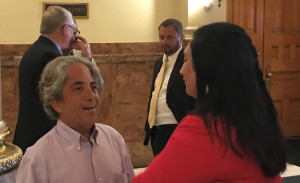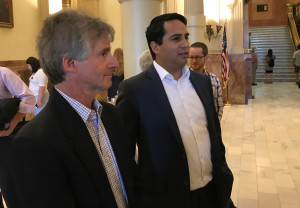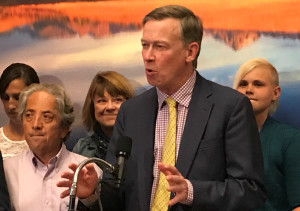DENVER – Just before Governor John Hickenlooper signed into law one of the most talked about bills of the 2017 legislative session, Senator John Kefalas, (D-Fort Collins) joked about the ups and downs of getting Senate Bill 17-040, known as Public Access to Government Files, through both chambers of the General Assembly.

“Greg Romberg and I talked about writing a memoir about this,” he said with a laugh. “But it does take a meaningful step forward in terms of making things available to the public.”
Romberg is a lobbyist for the Colorado Press Association and the Colorado Broadcasters Association.
Kefalas also got a lot of help from two freshman legislators in the House who rallied their colleagues in the final days of the session to support the bill.
Although supporters say there is still a long way to go with Colorado’s open records laws, the bill makes it easier for those seeking access to spreadsheets and other manipulatable data to obtain that data in its original format.
“Fundamentally the issue was that everybody agrees the government is the custodian of public records; the public records belong to the people, and therefore, we have a responsibility to make sure people can have proper access,” Kefalas said on Thursday. “They should be able to access them electronically in a way that allows them to analyze, sort and figure out the activities of government.”
Kefalas first brought the bill in 2016 after learning about an instance where a daily newspaper was denied digital access to a database containing university salaries. Instead, the newspaper was given a 145-page printed copy that reporters used to recreate the database.
It stalled in 2016 amid concerns it would open access to such things as medical, school and other personal identifying records. Some argued it could allow terrorists to get infrastructure records to things like water supplies and electrical grids.
“This was one of those bills that was hotly debated throughout the session,” Hickenlooper said. “It really did require some general caresses and firm molding.”
The effort in 2017 wasn’t much easier. It took nearly the entire session to please as many of the nearly 1,000 interested lobbyists as the sponsors could. The bill was introduced on the Senate floor on Jan 11, but didn’t get final passage until the last day of the 120-day session.
“The goal was to get it out of the Senate in a reasonable form,” Kefalas said. “They would have a lot of leverage in the House to take out the stuff that didn’t need to be in there and to add provisions that would strengthen the bill.”

That wasn’t quite as easy as first thought it would be, however. The bill’s House sponsor, Dan Pabon, (D- Denver) enlisted the help of freshman legislators Chris Kennedy, (D-Jefferson County) and Mike Weissman, (D-Arapahoe County) to strike a balance that would make the most stakeholders happy – or at least get them moving in the same direction.
Kennedy said he heard it the first time in the House Finance Committee, and it was clear there were a lot of issues that were going to make it hard to get it past his colleagues, so he asked Pabon what he could do to help.
“I had a little bit of free time, most of my bills were either through the process or taken care of,” Kennedy said. “It took a lot of work. There were a lot of things to get sorted out.”
Some of that involved the Senate’s inclusion of the Judicial branch in Colorado’s Open Records Act and concerns over whether deleted data could be recovered. The bill was opposed by most universities, school districts, counties, other municipalities and special districts.
Weissman said after most his bills were through the process, he too turned to colleagues to help where he thought he could do the most good.
“I didn’t want to stop working on things that I thought were important,” Weissman said. “When I came aware the CORA issue was coming to a head, open records for government is important, but at the same time, there are issues like individual privacy and critical infrastructure security that have to be balanced against it.”
Kennedy agreed.
“When we dug into this we realized the question about whether medical records would suddenly become available or student data for university students or public schools was real for our constituents,” Kennedy said. “Because I think they care both about the privacy but they also want to make sure their government is transparent. I think we struck the right balance.”
The bill was supported by just about every group on both sides of the political spectrum from Common Cause to Colorado Ethics Watch to the Independence Institute*.

Hickenlooper stressed the importance of the meeting of the minds during the signing on Thursday, jokingly saying he thought there would be more media at the signing.
“When you see the very conservative components of our community and the very liberal components of our community come together you know there are good things close at hand,” Hickenlooper said.
Kennedy and Weissman said their strategy was getting everyone to realize they weren’t going to solve all the problems in one bill.
“We narrowed down on one area where people could come to an agreement,” Weissman said. “Where a document exists in an electronic fashion, we ought to be able to get that it that way in 2017. I think everyone involved knows there will be discussions on this in the future as well.”
Kefalas said despite the turmoil in getting the bill on the Governor’s desk, he was pleased with the results.
“Once we got it out of the Senate, which was a piece of cake,” Kefalas said among laughter. “The House did its work, which was quite interesting. But ultimately it was a great way to cross the finish line, for this bill to pass on the last day of the legislative session, 35-0 in the State Senate — you try to explain that one.”
*Complete Colorado is a project of the Independence Institute.


